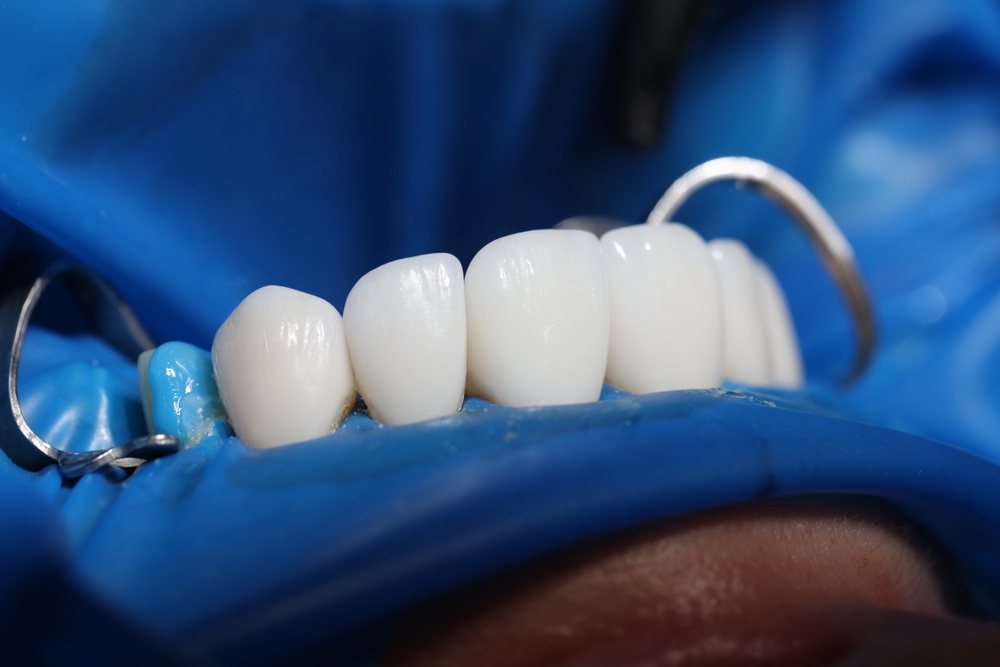Restore your smile with dental implants.
Did your dentist recommend dental implants to help improve your smile? If so, you might have a few questions about the procedure before moving forward. After all, this is a major type of restorative dentistry, and there are many different facets to consider. That’s why we’re here!
Today, we’re taking a closer look at how these implants work, as well as 7of the top benefits they can provide. Whether you’re seeking implants to help replace missing teeth or better support your dentures, these are the details to know.
How do dental implants work?
A dental implant is designed to serve as a substitute tooth root. Your dentist will strategically place a titanium post directly into your jawbone. From there, it will integrate with the bone to create a strong foundation for a prosthetic tooth, such as a crown, bridge, or denture. This process is called osseointegration.
Dental implants can be designed to replace a single tooth, or they can replace an entire set of teeth, offering more stability and functionality than regular dentures.
How can dental implants restore and improve your smile?
According to the American College of Prosthodontists, nearly 180 million Americans are missing at least one tooth. Does this include you?
Yours might have gotten knocked loose during an injury, or it could have fallen out due to decay or infection. Either way, leaving an empty space in your mouth can lead to a host of health issues, including jawbone deterioration.
Let’s take a look at 7 ways dental implants can help improve both the appearance and function of your smile.
1. Replace Missing Teeth
First, let’s start with the most obvious benefit. If you have missing teeth, a dental implant is the first place to start! An implant is designed to totally replace your missing tooth or teeth to give your smile a more uniform appearance. As long as you properly care for it, your implant can last for your whole life, making it a valuable investment.
2. Improve Your Confidence
Not only can it be more difficult to speak or eat with missing teeth, but it can also take a toll on your self-esteem. Research shows that more than half of all Americans feel insecure about their teeth. One in two will always smile with their mouth closed, while 57% will cover their mouths when they laugh.
You should feel free to smile wide and laugh big, and dental implants can help you feel confident enough to do so.
3. Stop or Reverse Jawbone Loss
When you have a missing tooth, the jawbone in that empty space will begin to deteriorate over time due to a lack of stimulation. This is an issue because your jawbone and teeth are designed to work in tandem with one another. When one part begins to wear away, it can negatively impact the other.
If left untreated, you might notice your face beginning to sag due to jawbone deterioration. When this happens, the lower one-third of your face will begin to close inward, drawing your chin closer to the tip of your nose. Not only can this change the shape of your face, but it could also cause your lips to appear thinner and your chin to become bonier, leading to a more aged appearance.
In addition to a missing tooth, you might also experience jawbone loss due to the following conditions:
- Facial trauma
- Tooth extractions
- Periodontal disease
- Gross malalignment or malocclusion
With an implant, you’ll replace not only the tooth itself, but also its root. This helps restore your normal chewing mechanism, generating the stimulation you need to encourage bone growth.
4. Help Your Dentures Fit Better
Another issue that can lead to jawbone loss? Loose, ill-fitting dentures. In addition to being uncomfortable, dentures that don’t fit correctly can also exacerbate many symptoms of jawbone deterioration.
As they slip out of place, they can rub against the bony ridge of your jawbone, gradually eroding it. With a dental implant, you can help eliminate the risk of loose, slipping, or wobbly dentures.
5. Keep Gum Disease At Bay
Any time you have a gap in your mouth, it can serve as a breeding ground for food, bacteria, and other debris. This can lead to periodontitis, or severe gum disease.
A dental implant fully fills in this open space, keeping that area clean and clear!
6. Stabilize Adjacent Teeth
Your dental implant will not require support from any of your adjacent teeth; however, it can help make them more stable!
You might notice the teeth surrounding your gap beginning to shift into the space. This pulls those teeth out of their original position, which can change both your appearance and your bite. In addition, it can also make it more difficult to chew.
If you suffer from a poorly aligned bite for too long, it can also trigger debilitating temporomandibular joint (TMJ) pain in your jaw. This condition can lead to discomfort and headaches.
7. Easy to Maintain
Dental implants are meant to feel and act like your normal teeth. This means you should be able to eat with them normally, as well as brush and floss them, along with the rest of your pearly whites, twice and once a day, respectively.
With fully restored chewing power, you’ll enjoy eating, drinking, and living your normal life without constantly thinking about the appearance of your smile or the function of your teeth.
Reach out for a consultation today.
If you have missing teeth, dental implants can help improve your confidence, restore your smile, and strengthen your jawbone. However, it’s important to understand how they work before moving forward.
If you’re considering any type of restorative dentistry, we’d love to connect. Our dental team can complete a comprehensive exam, recommend a treatment plan, and clear up any lingering concerns you might have.
Contact our office today to book an appointment and let’s take this next step together!






